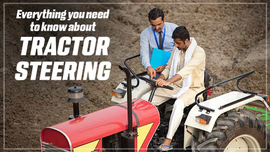Tractor Maintenance Guide: Maintenance and Servicing Tips

Table of Contents
- Checks to follow daily before starting your tractor
- Tips for Tractor Maintenance in Rainy Season
- Maintenance and Servicing after 50 to 60 Hours of Tractor Operation
- Maintenance and Servicing after 250 Hours of Tractor Operation
- Maintenance and Servicing after 500 Hours of Tractor Operation
- TREM IV Tractor Maintenance
Checks to follow daily before starting your tractor
In the rush of daily tasks in farming, you might miss out on these simple yet critical checks to follow. For instance, engine seizure commonly happens due to the lack of oil in the sump and overheating happens mainly due to the low amount of water in the radiator. Improper adjustment and lubrication in bearings and other moving parts is also another common issue. All of these common issues can be avoided by following certain checks before starting the tractor:
- Check the engine oil levels with your tractor parked on a flat surface
- Check the fuel quantity in the fuel tank to analyze if there is sufficient fuel to complete your required task.
- Check coolant level in the radiator or inspect cooling fins on air cooled tractor models.
- Check tyre pressure (refers to the owner's manual for proper inflation of front and rear tyres for each job).
- Check the condition of the tyres. Make sure to look for the cuts, cracks, and buckling.
- Check the battery, cables and terminals, and electrolyte level.
- Check the transmission and hydraulic oil levels.
- Check the operator's station to be sure that there is no spilled fuel, oil, grease, crop residue, or loose objects.
- Wash Implements after working in the field or before keeping them stored for a long time.
Tips for Tractor Maintenance in Rainy Season
- Ensure you use clutch look if the tractor is not going to be used for long hours.
- Remove & store the battery in a cool & covered place to ensure it doesn't get damaged with the moisture & temperature changes
- Protect from Moisture: Store your tractor in a dry, elevated area to prevent rusting. Avoid parking on grass or low-lying areas.
Maintenance after every 50 to 60 Hours of Tractor Operation
Some of the basic maintenance that you must do it yourself at home after every 50 to 60 hours of tractor operations are cleaning air filter and water separator.
Cleaning of Air Filter
Every one liter of fuel requires around 8 to 9 thousand litres of air for proper combustion. This air is derived by the engine from the atmosphere which is filled with dust or dirt particles. The air filters ensure to remove these dust particles from the air completely and provide clean air to the engine. During this filtration they trap millions of dust particles which can block the engine of air. This leads to drop in fuel efficiency, loss of power, and may cause engine wear-off. Also, if the dirt gets settled and allowed to reach the engine cylinders, this will damage piston rings, and cylinder walls. Hence, a proper cleaning and maintenance of the air filter is necessary. Perform these steps for servicing the air filter:
- Dismantle the air cleaner assembly completely.
- Remove the pre-cleaner and put it in the opposite direction of the air flow to clean it with air under pressure.
- Remove the top screen and clean it with kerosene or diesel with the help of a brush.
- Remove the used oil, clean with diesel and refill with fresh mobile oil to the mentioned level.
- Clean air hose and air pipe with compressed air.
- Once you are done with the entire process, then assemble the air filter and attach it safely into its mounting on the tractor.
Please note that you can apply all of these steps for cleaning a dry type air filter except for the fourth point. You will be required to clean the element by tapping or compressed air.
Cleaning of water separator
You are supposed to clean the water separator and diesel filter. Check for any leakage in the fuel line. Water separator is supposed to be clean for preventing moisture and rust issues.
Maintenance and Servicing after 250 Hours of Tractor Operation
Here are some other parts of the tractor that usually require servicing or maintenance generally after 250 hours of operation. However, this time span varies from brand to brand, so, make sure to confirm about the same regarding your tractor model. The manufacturer also gives complete details on what all checks will be done at every service interval such oil change, filter change etc. While the brand defines complete details, what are the additional maintenance check you must get it done at the service center is what we have outlined in the section below -
Servicing and Maintenance of Tractor Battery
Firstly, inspect the battery any loose terminals and electrolyte level. Then, wash the top of the battery with washing soda using warm water. Once you are done with washing, apply petroleum jelly to the terminals to prevent corrosion.
Battery liquid level should be maintained 10 mm above plates for restoring the electrolyte levels in order to avoid corrosion. Make sure to keep the battery near full charge in order to avoid sulfation which decreases the battery life.
Check and Adjust the Brakes
The uneven brake adjustment can impact the safety. Thus, firstly, check what provision is made for brake adjusting then Jack up the rear of the tractor until both rear wheels are clean of the ground. Release the brake interlock and then tighten adjusting screw, adjusting rod with the adjustment screw as per match with the manual. Slacken the adjuster screw until the wheel revolves freely without shoe rubbing on the drum. Adjust the second brake similarly.
Check and Adjust the Engine Clutch
The inadequate free movement clutch leads to clutch slip, overheating of the clutch plates, and rapid wear of lining materials on the clutch plate. Make sure to refer to your operator manual beforehand. Measure the clutch free movement and then locate means provided for this adjustment. Loosen the screw bolts and move the pedal round the clutch and then release the shaft according to needed adjustment. Once you are done, check pedal travel and then tighten the lock nut for securing the adjustment.
Lubrication
It is important to lubricate Fan-hub bearing, Throttle-control lever, Engine-clutch-release bearing Alternator bearing or any moving parts in in the tractor for smoother functioning.
Maintenance and Servicing after 500 Hours of Tractor Operation
The service hour intervals vary from tractor to tractor, for instance, a higher HP tractor has its first service interval at 400/500 hrs whereas a small tractor might have it at 250 hours. Thus, what are the service checks you should ensure in addition to the battery health, clutch & brakes check and lubrication of moving parts is what we have listed below.
Cleaning and Maintenance of Cooling System
Firstly, run the engine of your tractor so that it gets completely warm then drain the cooling system entirely. Thereafter close drain cocks and refill cooling system with water. If needed, you may also get flush compound or cleaner added to the water / coolant. Once it is done, start the engine and operate until it reaches its normal operating temperature. Additionally, check the external condition of cooling system to make sure there are no leakages. Completely drain the cooling system. You are then supposed to refill it with water for washing it and then drain it again. Finally, refill it with appropriate coolant.
Servicing Front-wheel Bearings
- Wash bearings thoroughly. Clean, hub, hub cap and spindle with solvent.
- Remove solvent from the bearings and other washed parts. Examine bearings for wear.
- Examine grease-retainer ring and seal. Replace if damaged.
- Remove solvent from the bearings and other washed parts.
- Examine bearings for wear.
- Examine grease-retainer ring and seal. Replace if damaged.
- Grease the bearing, hub and spindle.
You are also required to replace your oil or air filter as per your manufacturer's guidelines. Additionally, make sure to check your tractor’s fuel pump, transmission, hydraulics, and 4WD axle condition for timely maintenance.
TREM IV Tractor Maintenance
TREM IV tractors involve complex electronics which makes their maintenance also a bit complex and challenging in Indian context. Therefore, TREM IV tractors require extra care. If you observe an error code on your instrument cluster then you should get the tractor inspected promptly. Hence, provide special care and protection to your tractor. Make sure you safely store your fuel and do not use contaminated fuel. Use your tractor according to the designated guidelines as incorrect usage might lead to damaging the tractor. Keep your tractor clean and use canopy for preventing the tractor from rain water. Store your tractor at a properly covered place during the break.
Our final recommendation on tractor maintenance
To sum it up, the step one is to follow the service manual given by the brand during your tractor purchase, ensure you get the servicing done at the defined service intervals. At the same time, ensure the basic daily checks such as checking engine oil and at-home servicing after every 50 to 60 hours interval is done without fail. Ensure two season based checks are done – 1. from a weather standpoint i.e. during monsoon season and 2. from heavy operation standpoint i.e. pre-farming season.
This would be the key to increasing your tractor’s life and ensuring no major breakdowns happen during peak season usage. Therefore, leading to saving costs & increase tractor resale value in the long run.
A final tip – keep your ears & eyes opened. The moment you see any error code on your instrument cluster or feel the tractor is making any odd sound. It's time to go the service center immediately.


Related Blogs












